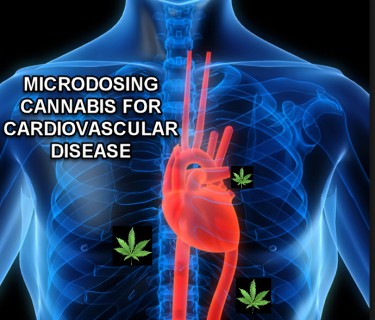
Reginald Examines the Heart of the Study…
Study claims daily cannabis smoke linked with 34% increase in CAD chances
As more and more states legalize cannabis, the once-taboo plant is making its way into the mainstream. Whether you use it for recreational or medical purposes, you've likely heard some of the conflicting information about its effects on the human body. Some people swear by it, claiming that it helps with everything from anxiety to chronic pain, while others caution against it, citing its potential to harm the lungs and impair cognitive function. So what's the truth?
Well, the truth is that it's complicated. Cannabis is a complex plant with hundreds of different chemical compounds, each of which can interact with the human body in different ways. This means that each individual's experience with cannabis is unique, with some people finding it calming and others finding it stimulating. And with more and more people admitting to using cannabis, researchers are finally able to collect more data on its consumption and effects.
However, as a forever skeptic, I know it's important to approach these studies with a healthy dose of skepticism. After all, we've seen time and time again how statistics can be manipulated to highlight certain preferred results.
That's why in this article, I'll be taking a closer look at the latest study that claims daily cannabis use increases the chances of coronary artery disease (CAD) by 34%. I'll examine the methods used by researchers to arrive at this conclusion and discuss what it means for those who use cannabis regularly.
But don't worry, I'm not here to scare you away from cannabis altogether. In fact, I believe that education is the key to making informed decisions about its use. That's why I'll also be providing "Good Heart Health tips" at the end of the article, so you can continue to enjoy your cannabis while taking care of your heart. Because let's face it, if you're going to indulge, you might as well do it in a way that's good for you.
So sit back, relax, and let's explore the complex world of cannabis and its potential impact on our bodies.
A Closer Look at the Claims of the Study
The American College of Cardiology released a study which suggests that daily cannabis use increases the likelihood of developing coronary artery disease (CAD) by one-third, compared to those who have never used the drug.
The study analyzed health data from 175,000 people and found that daily marijuana users were 34% more likely to develop CAD than those who had never used the drug. The research team utilized Mendelian randomization, a genetics-based approach, to identify a causal relationship between cannabis use disorder and CAD risk, using data from an independent genetics consortium.
Cannabis use disorder is a psychiatric disorder involving frequent marijuana use and dependency - but we also know that the DSM is a bit exaggerated.
After adjusting for age, sex, and major cardiovascular risk factors, the results indicated that daily cannabis users were 34% more likely to have CAD than those who have never used marijuana.
The study suggests that it is important for people to be aware of the risks associated with cannabis use and inform their doctors if they use cannabis so that clinicians can take appropriate steps to monitor their heart health.
The datasets used in this study did not differentiate between various forms of cannabis use, such as smoking or consuming edibles or other forms.
Therefore, it is crucial to examine the health implications of these different forms of cannabis consumption in future studies.
Core Points:
-
Daily cannabis use increases the likelihood of developing coronary artery disease (CAD) by one-third.
-
Daily marijuana users were found to be 34% more likely to develop CAD than those who have never used the drug.
-
Mendelian randomization, a genetics-based approach, was utilized to identify a causal relationship between cannabis use disorder and CAD risk.
-
It is important to be aware of the risks associated with cannabis use and inform doctors of cannabis use when monitoring heart conditions.
-
Further research is needed to understand the health implications of different forms of cannabis consumption.
How to Lie with Statistics
When it comes to interpreting data, there are a lot of common mistakes researchers can make. I'm talking about errors that can turn your findings from trustworthy to just another sensational headline.
One mistake researchers often make is overgeneralizing the results. You can't just assume that the results of a study on 175,000 people are representative of the entire population. That's like saying you can judge the taste of a cake by only trying a single crumb. Plus, the study only analyzed data from the All of Us Research Program, which may not be representative of cannabis users as a whole.
Another mistake is assuming causation from correlation. Just because there's a correlation between daily cannabis use and CAD, it doesn't mean that one causes the other. There could be other factors at play, like lifestyle habits or genetic predisposition, that contribute to the development of CAD.
But hey, let's give credit where credit is due. The study analyzed a massive sample size and used a genetics-based approach to establish a causal relationship between cannabis use disorder and CAD risk. That sounds pretty legit, right?
However, there's a catch. We don't have direct access to examine the datasets ourselves, so we have to trust the researchers' analysis and interpretation of the data. It's like trusting a cook who says the food is delicious, but you can't taste it yourself.
So how can we protect ourselves from potentially skewed results? First, we need transparency in scientific research. Researchers need to be upfront about their methods and analysis, and they should report all results, not just the ones that support their hypothesis.
Second, peer review and replication of studies are essential. We need other researchers to review and critique the study to identify potential biases and limitations that could affect the results. It's like a group of judges at a baking competition. They all have different tastes and opinions, but together they can identify the best cake.
Interpreting scientific research can be like walking through a minefield. There are a lot of potential biases and limitations to consider, and we have to trust the researchers' analysis of the data.
However, by demanding transparency and peer review, we can better ensure the accuracy and reliability of the results.
So next time you see a sensational headline about the latest scientific study, remember to approach it with a healthy dose of skepticism and a craving for more information - unlike the mainstream media that regurgitated the same article.
The Media as a Variable to Control
The media can be both a blessing and a curse. On the one hand, they can help disseminate important information quickly and effectively. On the other hand, they can also contribute to the spread of misinformation and bias. Take, for example, the recent media frenzy around the study linking daily cannabis use to an increased risk of coronary artery disease (CAD). As soon as the study was released, it seemed like every news outlet was publishing the same story, complete with the same quotes and statistics. This mass replication of the story gave the impression that the study was valid and reliable.
However, as we discussed earlier, there are several potential issues with the study that could compromise its validity. For one, it hasn't been peer-reviewed yet, so we don't know if other experts in the field would agree with its conclusions. Additionally, there could be unconscious biases in the way the data was collected, analyzed, and interpreted. And let's not forget the potential for deliberate manipulation of the data, whether by the researchers themselves or by external parties.
But with the media amplifying the story and presenting it as fact, many people are now convinced that daily cannabis use is a serious threat to their heart health. They might not even be aware of the potential flaws in the study or the fact that it hasn't undergone rigorous peer-review. This is a problem because the media can also be a variable that we need to consider when conducting cannabis research. Journalists might have their own unconscious biases or agendas that influence the way they report on studies. They might also be more inclined to cover studies that have attention-grabbing headlines, rather than studies that are more methodologically sound.
It's important to remember that just because a story is widely covered in the media doesn't necessarily mean it's true or accurate. We need to approach media coverage with a critical eye and consider the potential biases and flaws in the studies being reported on. Until the study linking daily cannabis use to CAD undergoes peer-review and further scrutiny, we can't take it as law.
This isn’t to say that we shouldn’t also take these findings seriously. Quite the opposite, if you have a history of heart disease - you may want to be aware of these facts. We still find that the majority of cannabis users don’t suffer from these issues, however, it’s good to be informed.
Good Heart Health Practices
Taking care of our heart is crucial to living a healthy and fulfilling life. In addition to being aware of the potential risks associated with cannabis use, there are many other steps we can take to promote good heart health.
First and foremost, maintaining a healthy and balanced diet can make a significant impact on our heart health. Eating a variety of nutrient-dense foods, including fruits, vegetables, whole grains, lean proteins, and healthy fats can help reduce the risk of heart disease.
Regular exercise is also key to good heart health. Even moderate physical activity, such as brisk walking or cycling, can help lower blood pressure, reduce inflammation, and strengthen the heart muscle.
Managing stress through relaxation techniques such as meditation, deep breathing, or yoga can also help reduce the risk of heart disease.
Avoiding or quitting smoking is one of the most effective ways to lower the risk of heart disease. Smoking damages the heart and blood vessels, and even secondhand smoke can be harmful to heart health.
Monitoring blood pressure, cholesterol, and blood sugar levels is also important for maintaining good heart health. Regular check-ups with a healthcare provider can help catch potential issues early and prevent serious heart problems down the line.
In summary, here are some key practices to promote good heart health:
-
Maintain a healthy and balanced diet
-
Engage in regular physical activity
-
Manage stress through relaxation techniques
-
Avoid or quit smoking
-
Monitor blood pressure, cholesterol, and blood sugar levels
Now go toke up you stoner!







